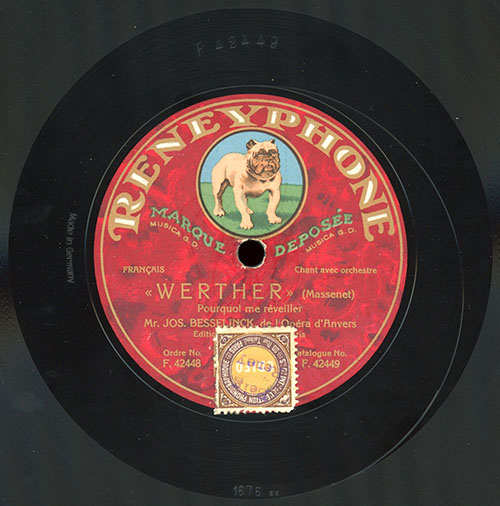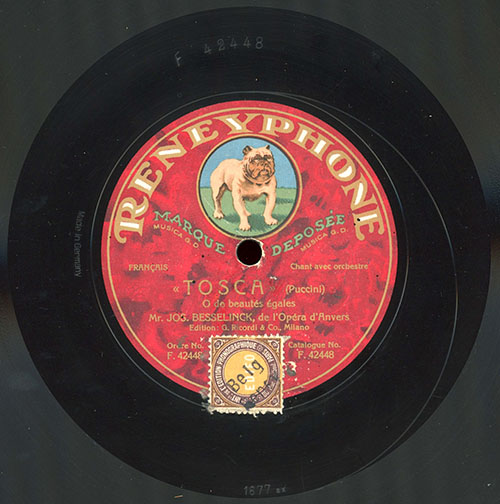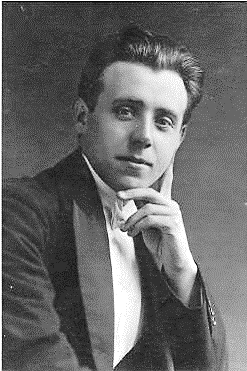Jos Besselink
His official name was Joseph Besselink, although he always abbreviated his first name to Jos, and appeared sometimes as José Besselinck. The youngest of ten siblings, he was born into the family of a café owner, who was also a great music lover. He became a church decorator and worked as such for three years, then he was drafted into the army half a year before World War I broke out; as soon as the war had begun, nobody was demobilized, and he had to stay in the army until 1919. However, it was no dreadful service: he was deployed to Arnhem, where he lived not in any barracks but with relatives, and he enjoyed considerable liberties – it seems that most of the time, he sang, in a church choir, a high-level amateur male choir, a double quartet, a military choir, a mixed choir. Twice a week, he went to Nijmegen to take voice lessons, and after a while, he gave his first solo concerts, founded his own male quartet and also appeared in operetta in Arnhem. Dutch soldiers, after World War I, had to find a civil job so as to be demobilized. Besselink went to Den Haag for an audition at the Hollandsche Schouwburg, was gladly accepted, and so his military career was over. His Den Haag contract started in fall 1919; in summer, he sang a highly successful concert in Scheveningen, and on 30 September, he made his opera debut in Mozart's Bastien und Bastienne. After a few secondary roles, he got his first leading part: Don José. Before long, he appeared also with the Toonkunst society in Den Haag and in Rotterdam, as well as at the Paleis voor Volksvlijt in Amsterdam. When he stepped in for a sick colleague as Pinkerton in Rotterdam, it was his breakthrough; he sang the role throughout the Netherlands, in Utrecht, Groningen, Nijmegen, Amsterdam, Haarlem, Breda... And he also did a lot of concert work, not least of sacred music. But fees were low in the Netherlands, and so he went to Germany in 1922. He took lessons in German repertory in Berlin, made several guest appearances as well as records, and finally got a contract as first heldentenor at the Municipal Theater in Liegnitz in September 1923. However, German hyperinflation forced him to return to the Netherlands. Not for long, though: he got a contract at the Royal Flemish Opera in Antwerp, where he spent his best years. As a guest, he sang at the Théâtre de la Monnaie in Brussels, and in concert in Maastricht. His most successful roles were Don José, and the Astrologer in Zolotoj petushok (The golden cockerel). His success was furthered by his eccellent acting abilities. In 1927, he returned to his native country, and sang in Amsterdam and Haarlem. But it was a tough period for opera theaters in the Netherlands: the economic crisis caused several companies to go bankrupt. Besselink sang his last performance on 1 October 1927 in Haarlem, then he bid farewell to the stage, also because his voice had deteriorated. Earlier the same year, he had already laid the foundation to his second career by establishing a catholic choir in his native Hengelo; he became the choir conductor. In 1928, a second choir (from Hoog-Keppel) hired him for the same post, which he was to hold for 25 years. With both choirs, he earned lots of prizes at competitions. The choir in Hoog-Keppel also staged open-air operetta performances each summer; Besselink not only conducted, but was also the stage director, and even returned to the stage from time to time. In 1936, he became – without leaving Hoog-Keppel, mind you – director of the Koninklijk Doesborghs Mannenkoor, the Royal Male Choir in nearby Doesburg, which he conducted for 23 years, again winning many prizes; plus in 1944, he took over the Dierense Harmonie Corps, yet another choir; its former director, a friend of Besselink's, had died in a prison of the Nazi occupiers. All that rather frenetic conducting activity, though, was only Besselink's second job; by day, he earned money as the manager of a wine import company in Zutphen. Besselink retired in 1959; five years later, he received the papal distinction "Pro Ecclesia et Pontifice" for his services to sacred music. Reference 1 and picture source; reference 2: Kutsch & Riemens


I would like to thank Anton Bieber for the recordings and label scans. |
